Animal Welfare Updates - December 2018
Message from the Director
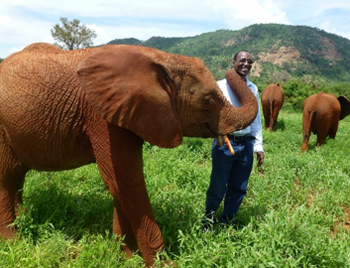 I am always amazed at just how fast a year goes by. It seems like just yesterday when I was wishing you all a prosperous 2018! I am, nonetheless, grateful to be marking another New Year with you for supporting ANAW in realizing milestones in 2018. I am always amazed at just how fast a year goes by. It seems like just yesterday when I was wishing you all a prosperous 2018! I am, nonetheless, grateful to be marking another New Year with you for supporting ANAW in realizing milestones in 2018.
In this last quarter, we held the 8th Inter-agency forum on Wildlife and Environmental Crimes (the Eighth National Judicial Dialogues). It is always heartening to see the diverse stakeholders represented at these forums which are convened with the aim of encouraging agencies and the public to work in a collegiate manner, share information, exchange experiences and develop ways to overcome technical, bureaucratic and administrative bottlenecks hindering inter-agency cooperation in wildlife crime management. We left the meeting committed to the work ahead of us that will ensure our heritage is protected for future generations. One significant impact of the dialogues is increased conviction rate and that through effort of addressing wildlife crimes, Kenya came off the CITES list of gang of 8. Gang of eight were the worst offending countries in the ivory trade. Also read on success in animal rescues, promoting animal welfare in schools (PAWS) program amongst others. Please read on.
On behalf of all in the ANAW family, I sincerely wish to thank you all for your support in 2018. You have made a great contribution to Africa’s animals and with your continued support; we are without a doubt looking forward to 2019 with renewed energy of promoting humane treatment of all animals.
Wishing you a Happy Christmas and a prosperous 2019. |
More Than 15 Wild Animals Freed from Pain and Injury
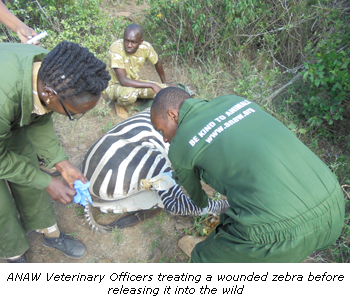 Bushmeat crisis is the most significant and immediate threat to wildlife populations in Africa today. According to the report ‘Lifting the Siege, Securing Kenya’s Wildlife’ done by a Task Force on Wildlife Security, subsistence bush meat poaching has hit unprecedented levels with the growing commercial bush meat trade, now a highly lucrative business, emerging as a multi-million-shilling industry that poses a serious threat to conservation. Bushmeat crisis is the most significant and immediate threat to wildlife populations in Africa today. According to the report ‘Lifting the Siege, Securing Kenya’s Wildlife’ done by a Task Force on Wildlife Security, subsistence bush meat poaching has hit unprecedented levels with the growing commercial bush meat trade, now a highly lucrative business, emerging as a multi-million-shilling industry that poses a serious threat to conservation.
Factors that propagate this savage act are driven by demand for cheaper sources of meat as well as a means of livelihood through illegal commercial trade. ANAW through its robust mission of working with partners like Animal Welfare Institute (AWI), Kenya Wildlife Service (KWS) and other like-minded partners has this far stepped up to tackle this detrimental vice that poses a deleterious effect on our wildlife heritage.
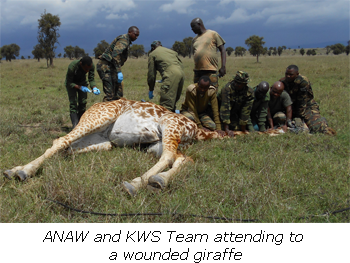 Between the months of August-December 2018, and through ANAW’s Anti-Bushmeat Initiatives encompassing both emergency wildlife rescues and routine de-snaring patrols, a cumulative total of 17 wild animals (9 Zebras, 2 Buffalos, 3 Waterbucks, 1 Impala and 2 Giraffe) were rescued during the campaigns mounted in 3 of our core project zones Nairobi, Nakuru and Machakos Counties. Between the months of August-December 2018, and through ANAW’s Anti-Bushmeat Initiatives encompassing both emergency wildlife rescues and routine de-snaring patrols, a cumulative total of 17 wild animals (9 Zebras, 2 Buffalos, 3 Waterbucks, 1 Impala and 2 Giraffe) were rescued during the campaigns mounted in 3 of our core project zones Nairobi, Nakuru and Machakos Counties.
During the same period, through ANAW’s collaboration with Colobus Conservation (Primate Rescue and Rehabilitation Centre) in Diani Kwale County, where we have our resident vet (Dr. Janerose Mutura), we were able to attend to 30 animals (9 Colobus, 7 Sykes, 5 Vervets, 4 Baboons, 2 Bush-babies, 1 Lesser Crested Tern, 1 White Faced Scops Owl and 1 Ochre Bush Squirrel.
ANAW in collaboration with all the mentioned partners also spearheaded a spirited community outreach and awareness campaign on the significance of wildlife and habitat conservation to the surrounding communities leaving within the animal habitats. |
ANAW’s De-snaring Team Apprehends a Suspected Bush-Meat Poacher
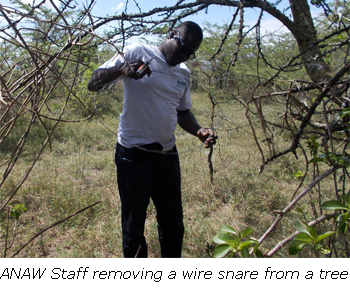 In our efforts to curb bush meat poaching, ANAW in partnership with Soysambu Conservancy, Kenya Wildlife Service (KWS) organized a de-snaring exercise between 20th and 23rd November 2018. The expedition also involved our partners - Project Abroad and Bweha Camp. In our efforts to curb bush meat poaching, ANAW in partnership with Soysambu Conservancy, Kenya Wildlife Service (KWS) organized a de-snaring exercise between 20th and 23rd November 2018. The expedition also involved our partners - Project Abroad and Bweha Camp.
The exercise was aimed at safeguarding wildlife habitat and ensuring wildlife welfare by removing snares, rescuing trapped animals and mobilizing help for the injured animals from KWS vets. The exercise also endeavored to gather, assess and log wildlife threats, deter poaching in the area, document and report the findings. In addition, the exercise propagated cordial human-wildlife coexistence with the neighboring communities.
The exercise helped lift 203 snares consisting of 118 live snares (snares that are freshly set to capture an animal) and 85 dead snares (snares that have been used before but have the potential of capturing an animal). Painfully, at least three animals (2 zebras and 1 impala) were confirmed to have died from snares; more sadly, one zebra dying moments before it could be untangled from a neck snare.
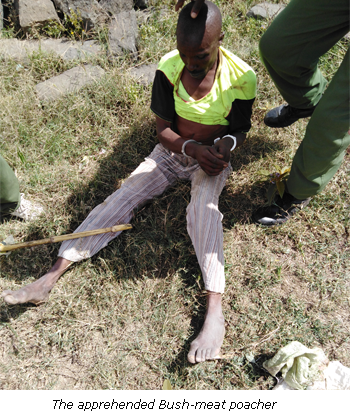 Consequently, the KWS rangers with the team managed to apprehend one poacher in possession of 210Kgs of zebra meat valued at approximately Kshs. 83,200 that had been packed in eight gunny bags. Two of his accomplices escaped from the team’s dragnet. The suspect, who appeared before a Nakuru County Chief Magistrate, was set to ferry the bush meat to unknown destination via a motorcycle for sale to unsuspecting customers. Although the accused denied the charge, he was released on a Kshs. 1million bond with surety of a similar amount or an alternative cash bail of Kshs. 500,000. Consequently, the KWS rangers with the team managed to apprehend one poacher in possession of 210Kgs of zebra meat valued at approximately Kshs. 83,200 that had been packed in eight gunny bags. Two of his accomplices escaped from the team’s dragnet. The suspect, who appeared before a Nakuru County Chief Magistrate, was set to ferry the bush meat to unknown destination via a motorcycle for sale to unsuspecting customers. Although the accused denied the charge, he was released on a Kshs. 1million bond with surety of a similar amount or an alternative cash bail of Kshs. 500,000. |
44 Teachers Awarded International Certificate in Humane Education
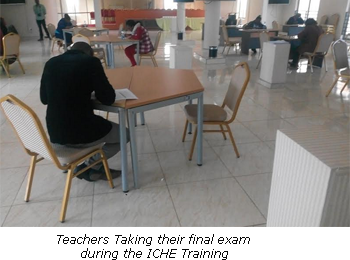 The last quarter of this year saw a flurry of activities in Promoting Animal Welfare in Schools (PAWS) project. A project implemented through the ANAW-SPANA (Society for the Protection of Animals Abroad) partnership. We are ever gladdened by the impact the program is having on the more than 11,000 students who have so far attended the Animal Welfare Clubs (AWC) in the 42 schools, within our five Counties of operations (Kiambu, Machakos, Makueni, Kajiado and Nairobi). The last quarter of this year saw a flurry of activities in Promoting Animal Welfare in Schools (PAWS) project. A project implemented through the ANAW-SPANA (Society for the Protection of Animals Abroad) partnership. We are ever gladdened by the impact the program is having on the more than 11,000 students who have so far attended the Animal Welfare Clubs (AWC) in the 42 schools, within our five Counties of operations (Kiambu, Machakos, Makueni, Kajiado and Nairobi).
We started off by, visiting and enhancing capacities of pupils within PAWS registered schools between 9th and 23rd October 2018. However, due to circumstances beyond our control, one school dropped off the PAWS project, to join later in future. We therefore closed the year with a total of 41 schools.
Certificates were issued to the outgoing students and a review of the activities of the year done with the aim of bettering the objective in 2019. |
31 More Teachers Graduate with International Certificate in Humane Education
Further, between 26th November and 7th December this year, the second part of International Certificate in Humane Education (ICHE) training took place involving teachers drawn from the five Counties. Another product of the partnership between ANAW and SPANA.
The training sessions geared towards equipping teachers with knowledge and skills that would enable them to integrate humane pedagogy in their normal lessons as well as manage the clubs effectively were facilitated by Humane Education Officer (ANAW) Susan Mwai and Academy of Prosocial Learning’s (Pennsylvania, US) President, Stephanie Itle-Clark. A total of 31 teachers were able to complete the course successfully and were awarded International Certificate in Humane Education. This brings to the total of ICHE Course graduates to 44, since the training was rolled out in Kenya last year.
It is hoped that teachers will use the skills they have acquired to reinvigorate animal welfare education in their respective schools and help pass on virtues of kindness, empathy and respect to all students and achieve the most desired long-term social change.
Animal Welfare Centre (AWC) Patrons Hold End of Year Workshop
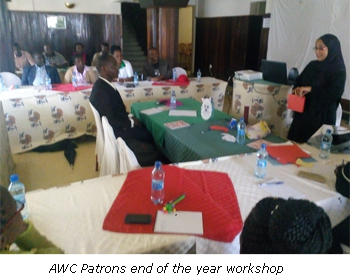 The AWC patrons’ End of the Year workshop was held on 14th December 2018 in Machakos County. This was a time to evaluate individual performance within respective clubs and make suggestions on how to improve the running of the clubs in 2019. During the workshop, teachers had a chance to learn how to improvise learning materials with their learners to enhance retention of content delivered The AWC patrons’ End of the Year workshop was held on 14th December 2018 in Machakos County. This was a time to evaluate individual performance within respective clubs and make suggestions on how to improve the running of the clubs in 2019. During the workshop, teachers had a chance to learn how to improvise learning materials with their learners to enhance retention of content delivered |
Stakeholder Forum on Donkey Slaughter and Skin Trade in Ethiopia
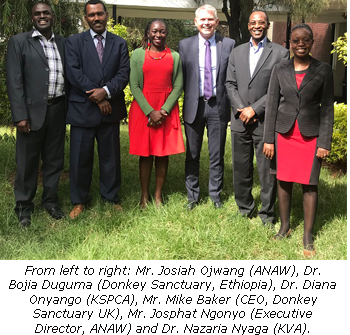 The Donkey Sanctuary and Government of Ethiopia convened a regional stakeholder forum to discuss the slaughter of donkeys and skin trade in the country. The forum was held against the backdrop of community agitation against the slaughter of donkeys and the determination of Chinese investors to set up donkey abattoirs in Ethiopia; attracted by its large donkey population estimated at 8.4 million, currently the largest globally. The Donkey Sanctuary and Government of Ethiopia convened a regional stakeholder forum to discuss the slaughter of donkeys and skin trade in the country. The forum was held against the backdrop of community agitation against the slaughter of donkeys and the determination of Chinese investors to set up donkey abattoirs in Ethiopia; attracted by its large donkey population estimated at 8.4 million, currently the largest globally.
Josphat Ngonyo, Executive Director – ANAW and Josiah Ojwang, Program’s Manager ANAW were invited to represent ANAW at the forum and share their donkey experiences
The outcome was formation of a task force to interrogate the issue further, including conducting socio-economic research on the impact of the trade on communities. |
Inter-Agency Forum on Wildlife and Environmental Crimes Held
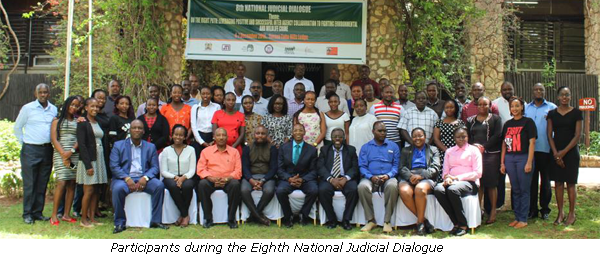 In collaboration with the Judiciary Training Institute (JTI), the Kenya Wildlife Service (KWS) and the Office of the Director of Public Prosecutions (ODPP), ANAW co-hosted the 8th Intra-Agency Forum on Wildlife and Environmental Crimes on 4 - 7 December 2018 at Sarova Taita Hills Game Lodge within Taita Hills Wildlife Conservancy in Taita Taveta County. The forum themed ‘On the Right Path: Leveraging Positive and Successful Inter-Agency Collaboration to Fighting Environmental and Wildlife Crime’ brought together participants; comprising of a judge, magistrates, prosecutors, investigators, participants drawn from the civil society, wildlife and environmental conservation partners and community representatives. In collaboration with the Judiciary Training Institute (JTI), the Kenya Wildlife Service (KWS) and the Office of the Director of Public Prosecutions (ODPP), ANAW co-hosted the 8th Intra-Agency Forum on Wildlife and Environmental Crimes on 4 - 7 December 2018 at Sarova Taita Hills Game Lodge within Taita Hills Wildlife Conservancy in Taita Taveta County. The forum themed ‘On the Right Path: Leveraging Positive and Successful Inter-Agency Collaboration to Fighting Environmental and Wildlife Crime’ brought together participants; comprising of a judge, magistrates, prosecutors, investigators, participants drawn from the civil society, wildlife and environmental conservation partners and community representatives.
The rationale of the just concluded 8th dialogue arose from the realization that these National Judicial Dialogues on Wildlife and Environmental Crimes fora as established in 2013, were to provide a common platform for stakeholders to identify key gaps, exchange experiences, share lessons and implement resolutions through cooperation and collaboration among the justice chain stakeholders hence it was important to assess if they were on the right path as captured in the theme.
Welcoming the participants to the 8th dialogue, Prof. James Nkansah, the ANAW Board Vice Chairman took time to welcome and congratulate Hon. Justice Kathurima M’Inoti (Judge of Appeal), the New Director for Judiciary Training Institute (JTI) for taking leadership at the Judiciary Training Institute and his commitment in fighting and environmental crimes. “As ANAW, we pledge our unrelenting support and commitment to work together with JTI and all other stakeholders in address wildlife crimes.”
On moving forward, Prof. Nkansah said, “Looking backward, there is a lot we need to do as we go forward. ONE, we need to move on with the dialogue so that we can realize the overall mandate of these dialogues. TWO, we also need to firm this inter-agency collaboration structure and take to fruition the curriculum which we have in draft form currently, to be used in future by agencies to induct their new members. THREE, there is need for continued support of the Environment Land Court (ELC), gazette Environmental Magistrates and a publication of environmental digest.”
Speaking as he officiated the opening of the 8th National Judicial Dialogue on Wildlife and Environmental Crimes, the Judiciary Training Institute’s (JTI) Deputy Director, Dr. Steve Ouma, hailed the inter-agency collaboration and reminded the judicial officers present that the legislative powers they exercise were derived from the people of Kenya based on Article 3 of the Constitution of Kenya 2010, which gave sovereignty to the citizens. “The power to judge comes directly from the people, who put it in the constitution by way of delegation.” He said.
“The law of litigation has become more complex and is moving from professionalism to specialization. This, therefore, brings about the need to offer specialized judicial training to produce competent, independent and impartial judicial officers.” He quipped. Overall, the workshop focused on the following topics; Bush Meat Poaching; Evidence and Crime Scene Management; Wildlife Utilization; and Emerging Jurisprudence and Emerging Issues around Wildlife and Environmental Crime; among others.
All the agencies represented pledged to collectively continue with the intra-agency collaboration in fighting environmental and wildlife crimes as they continued to share successes, developments and challenges of their individual contribution to the success of the collaborations. Our deep appreciation goes to African Fund for Endangered Wildlife and Wildlife Direct for their support in cohosting the Dialogue. |
Denver University Team Relate Animal Welfare with Social Work Principles
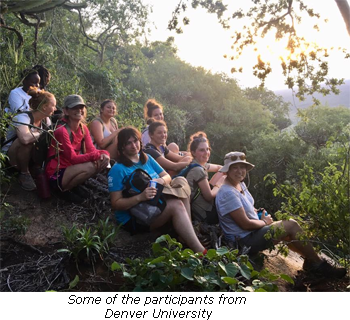 Seeming like a fruitless effort, Fred stepped harder on the gas pedal and we all felt the wheels spinning fast. It had rained heavily the previous night and the small road through the bush was muddy. Fred had tried to swerve the bus past the slight pothole on the slippery bumpy dirt road but the bus slid into it. He revved up the engine ardent and focused. Cheers and claps of joy went up the air when the bus lurched forward and started moving again. Seeming like a fruitless effort, Fred stepped harder on the gas pedal and we all felt the wheels spinning fast. It had rained heavily the previous night and the small road through the bush was muddy. Fred had tried to swerve the bus past the slight pothole on the slippery bumpy dirt road but the bus slid into it. He revved up the engine ardent and focused. Cheers and claps of joy went up the air when the bus lurched forward and started moving again.
The group of about 25 was in Soysambu Conservancy undertaking a de-snaring operation with the ANAW team. Students from University of Denver, Graduate School of Social Work and ANAW staff were taking part in a two-week experiential learning program that ran from December 1 - 15, 2018. This was the 11th annual trip since the partnership between the two began. The partnership is aimed at seeking a balance between animal welfare, human welfare and conserving the ecosystem.
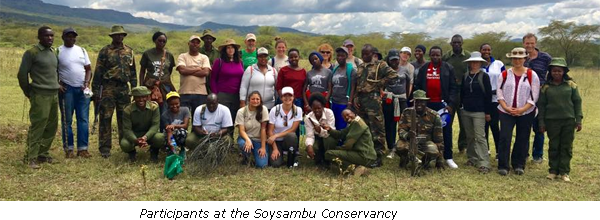 The students brought much insight to the topic and their studies focus on specializations such as Sustainable Development and Global Practices, Aging Services and Policy, Children and Youth, Child Welfare, Family Systems and Practice, Mental Health, and Health and Wellness. Themed ‘Women in Conservation’, the 12-female student team accompanied by two professors and a community representative were heavily involved in the hands-on experience within the first two weeks of December The students brought much insight to the topic and their studies focus on specializations such as Sustainable Development and Global Practices, Aging Services and Policy, Children and Youth, Child Welfare, Family Systems and Practice, Mental Health, and Health and Wellness. Themed ‘Women in Conservation’, the 12-female student team accompanied by two professors and a community representative were heavily involved in the hands-on experience within the first two weeks of December
The team ventured from Nairobi to Naivasha, Voi, Kasigau and Diani actively taking part in the planned activities in different communities. The trip revealed and tested every student’s knowledge, strength, endurance, experience and interpersonal skills. They applied their acquired insight and intuition in crucial tasks on the ground.
A team well-versed with current happenings in human-animal co-existence, animal care, advocacy and awareness topics went back to Denver, Colorado on December 15, 2018. Future plans to merge objectives developed by the two institutions were made to further venture into joint programs. We thank and congratulate both teams for making the trip a success. |
Leave a Legacy of Compassion for Animals.
Here’s a great way to support Africa Network for Animal Welfare (ANAW) and enable us to protect future generations of animals. By putting a bequest to ANAW in your will or trust, you will help us to improve the lives of animals far beyond your lifetime.
Contact Emma Wanja at This email address is being protected from spambots. You need JavaScript enabled to view it. if you need additional information about how to include us in your will.
You can also support our work by donating online through our secure online platform. Please, click on the donate button below to submit a donation.

On behalf of the animals we work for, thank you!
|
End of Year Best Wishes!
And finally, As the year ends, we wish to deeply and sincerely thank you for your continued partnership and support to ANAW. You have helped make a big difference to the animals and you can expect an annual report with all the activities done in the year 2018 early next year
From the entire team at ANAW in Africa and in the USA:
The love that our animals show us envisions a glimpse of God’s magnificent love for humankind. And as this festive season snuggles us in happy clouds of love, laughter, warmth and peace, WE wish you a very Merry Christmas and a Happy Prosperous New Year 2019. |
| |
| |
| |
| |
| |